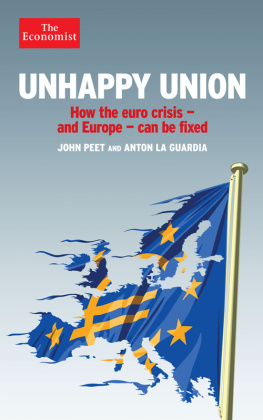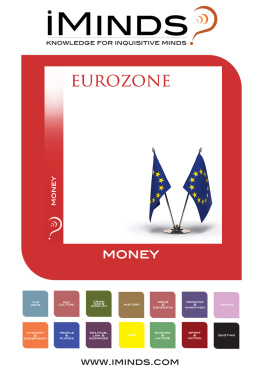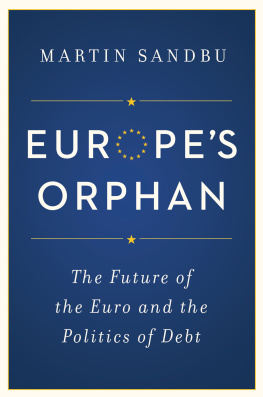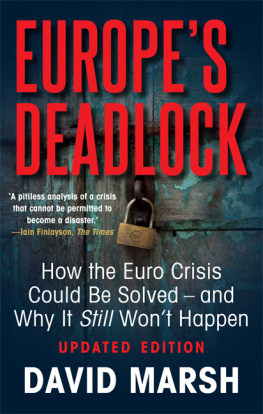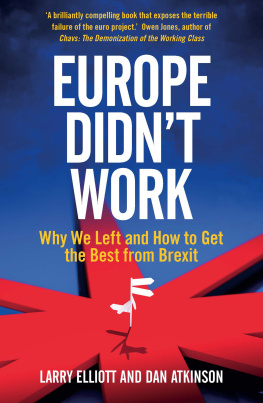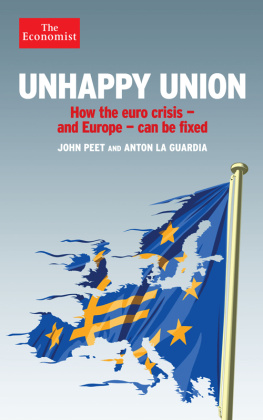UNHAPPY UNION
JOHN PEET is Europe editor and a former Brussels correspondent of The Economist. He was previously Washington correspondent and business affairs editor.
ANTON LA GUARDIA is Brussels correspondent of The Economist and writes the Charlemagne column. He was previously The Economists defence correspondent, after working for two decades as a foreign correspondent in the Middle East and Africa. He is the author of Holy Land, Unholy War: Israelis and Palestinians (Penguin, 2006).
OTHER ECONOMIST BOOKS
Guide to Analysing Companies
Guide to Business Modelling
Guide to Business Planning
Guide to Cash Management
Guide to Commodities
Guide to Decision Making
Guide to Economic Indicators
Guide to Emerging Markets
Guide to the European Union
Guide to Financial Management
Guide to Financial Markets
Guide to Hedge Funds
Guide to Investment Strategy
Guide to Management Ideas and Gurus
Guide to Managing Growth
Guide to Organisation Design
Guide to Project Management
Guide to Supply Chain Management
Numbers Guide
Style Guide
Book of Business Quotations
Book of Isms
Book of Obituaries
Brands and Branding
Business Consulting
Business Strategy
Buying Professional Services
Doing Business in China
Economics
Managing Talent
Managing Uncertainty
Marketing
Marketing for Growth
Megachange the world in 2050
Modern Warfare, Intelligence and Deterrence
Organisation Culture
Successful Strategy Execution
The World of Business
Directors: an AZ Guide
Economics: an AZ Guide
Investment: an AZ Guide
Negotiation: an AZ Guide
Pocket World in Figures

UNHAPPY UNION
How the euro crisis and Europe can be fixed
John Peet and Anton La Guardia
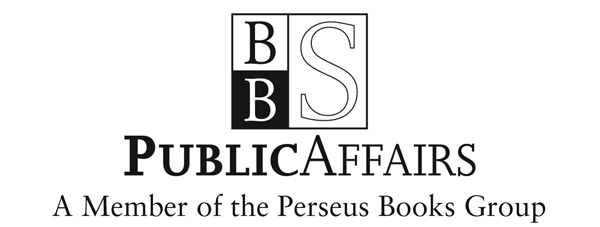
THE ECONOMIST IN ASSOCIATION WITH
PROFILE BOOKS LTD AND PUBLIC AFFAIRS
Copyright The Economist Newspaper Ltd, 2014
Text copyright John Peet and Anton La Guardia, 2014
First published in 2014 by Profile Books Ltd. in Great Britain.
Published in 2014 in the United States by PublicAffairs, a Member of the Perseus Books Group
All rights reserved. No part of this book may be reproduced, stored in or introduced into a retrieval system, or transmitted, in any form or by any means (electronic, mechanical, photocopying, recording or otherwise), without the prior written permission of both the copyright owner and the publisher of this book, except in the case of brief quotations embodied in critical articles and reviews. For information, address PublicAffairs, 250 West 57th Street, 15th Floor, New York, NY 10107.
The greatest care has been taken in compiling this book. However, no responsibility can be accepted by the publishers or compilers for the accuracy of the information presented.
Where opinion is expressed it is that of the author and does not necessarily coincide with the editorial views of The Economist Newspaper.
While every effort has been made to contact copyright-holders of material produced or cited in this book, in the case of those it has not been possible to contact successfully, the author and publishers will be glad to make amendments in further editions.PublicAffairs books are available at special discounts for bulk purchases in the U.S. by corporations, institutions, and other organizations. For more information, please contact the Special Markets Department at the Perseus Books Group, 2300 Chestnut Street, Suite 200, Philadelphia, PA 19103, call (800) 810-4145, ext. 5000, or e-mail special.markets@perseusbooks.com.
Library of Congress Control Number: 2014936676
HC ISBN: 978-1-61039-449-9
e-book ISBN: 978-1-61039-450-5
First Edition
List of figures
Acknowledgements
MANY POLITICIANS, OFFICIALS , diplomats, academics, think-tankers and fellow journalists have helped us to form our ideas and write this book, some without realising it. A large number of people gave generously of their time and shared their insights (and often their personal notes of events), but wish to remain anonymous. We would like to thank them all.
For the Charlemagne columnist covering the twists and turns of the crisis from Brussels, the press corps has been a source of good cheer and comradeship, and a forum for the exchange of information, through endless late-night meetings of European leaders and finance ministers. The colleagues and guests of the Toucan dinner club have produced many enlightening and enjoyable evenings.
The job of interpreting events has been made much easier thanks to the expertise of scholars who follow the often arcane affairs of the EU. They include staff at the Brussels think-tank, Bruegel among them Guntram Wolff, Jean Pisani-Ferry, Andr Sapir, Zsolt Darvas and Silvia Merler who have offered invaluable expertise over the years. Similarly, Daniel Gros at the Centre for European Policy Studies has been a source of sharp perspective. On questions of Europe in the wider world many have been helpful and incisive, among them Jan Techau at Carnegie Europe, Daniel Keohane at FRIDE, Sir Michael Leigh at the German Marshall Fund of the United States, as well as the many experts of the European Council on Foreign Relations. Philippe Legrain, formerly at the European Commissions Bureau of European Policy Advisers, has been refreshingly trenchant and forthright in his views of where Europe has gone wrong.
We would like to thank Stephen Brough, Penny Williams and Jonathan Harley for incubating this book and seeing it through to completion with charm and patience, despite many interruptions and changes to the manuscript. Andrea Burgess and Roxana Willis at The Economist have been indefatigable researchers in finding data and producing charts.
We owe a special thanks to several people who took the time to read drafts of our manuscript and commented on all or parts of it. They include Charles Grant and Simon Tilford at the Centre for European Reform and Heather Grabbe at the Open Society Foundations, as well as our colleagues at The Economist, Edward Carr and Zanny Minton Beddoes.
No one can write a book without being a burden on their families. Accordingly, we dedicate this one to our ever-supportive spouses, Sara and Jane.
Preface
EUROPE HAS LONG PRIDED ITSELF on being a model for the rest of the world of how to reconcile old enemies after centuries of war, blend the power of capitalism with social justice and balance work with leisure. Little matter that Europeans did not generate as much wealth as overworked Americans; Europeans took more time off to enjoy life. And little matter that Europe could not project the same military force as the United States; Europe saw itself as a normative power, able to influence the world through its ability to set rules and standards. Some Europhiles even imagined that Europe would run the 21st century, as the title of one optimistic book put it.
The collapse of subprime mortgages in the United States, and the credit crunch that followed, only confirmed such convictions. The single currency, the European Unions most ambitious project, was seen as a shield against financial turbulence caused by runaway American ultra-liberalism, as the French liked to describe the faith in free markets. But when the financial storm blew in from across the Atlantic, the euro turned out to be a flimsy umbrella that flopped over in the wind and dragged away many of the weaker economies. It led to the worst economic and political crisis in Europe since the second world war.
Next page
